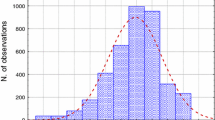Abstract
This paper approaches the problem of feature selection in the context of ordinal classification problems. To do so, an ordinal version of the Fisher score is proposed. We test this new strategy considering data from an European social survey concerning subjective well-being, in order to understand and identify the most important variables for a person’s happiness, which is represented using ordered categories. The input variables have been chosen according to previous research, and these have been categorised in the following groups: demographics, daily activities, social well-being, health and habits, community well-being and personality/opinion. The proposed strategy shows promising results and performs significantly better than its nominal counterpart, therefore validating the need of developing specific ordinal feature selection methods. Furthermore, the results of this paper can shed some light on the human psyche by analysing the most and less frequently selected variables.
This work has been subsidised by the TIN2014-54583-C2-1-R project of the Spanish Ministerial Commission of Science and Technology (MICYT), FEDER funds and the P11-TIC-7508 project of the “Junta de Andalucía” (Spain).
Access this chapter
Tax calculation will be finalised at checkout
Purchases are for personal use only
Similar content being viewed by others
Notes
References
Linley, P.A., Maltby, J., Wood, A.M., Osborne, G., Hurling, R.: Measuring happiness: the higher order factor structure of subjective and psychological well-being measures. Pers. Individ. Differ. 47, 878–884 (2009)
Diener, E.: Subjective well-being: the science of happiness and a proposal for a national index. Am. Psychol. 55, 34–43 (2000)
Self, A., Thomas, J., Randall, C.: Measuring national well-being: Life in the uk (2012). Accessed 8 December 2015
Keyes, C.L., Shmotkin, D., Ryff, C.D.: Optimizing well-being: the empirical encounter of two traditions. J. Pers. Soc. Psychol. 82, 1007 (2002)
Gutiérrez, P.A., Pérez-Ortiz, M., Sánchez-Monedero, J., Fernández-Navarro, F., Hervás-Martínez, C.: Ordinal regression methods: survey and experimental study. IEEE Trans. Knowl. Data Eng. 28, 127–146 (2016)
Gu, Q., Li, Z., Han, J.: Generalized fisher score for feature selection. CoRR abs/1202.3725 (2012)
Bixter, M.T.: Happiness, political orientation, and religiosity. Personality Individ. Differ. 72, 7–11 (2015)
Luengo, J., García, S., Herrera, F.: On the choice of the best imputation methods for missing values considering three groups of classification methods. Knowl. Inf. Syst. 32, 77–108 (2012)
Pérez-Ortiz, M., Gutiérrez, P.A., Hervás-Martínez, C.: Projection-based ensemble learning for ordinal regression. IEEE Trans. Cybern. 44, 681–694 (2014)
Baccianella, S., Esuli, A., Sebastiani, F.: Feature selection for ordinal text classification. Neural Comput. 26, 557–591 (2014)
Mukras, R., Wiratunga, N., Lothian, R., Chakraborti, S., Harper, D.: Information gain feature selection for ordinal text classification using probability re-distribution. In: The IJCAI 2007 Workshop on Text Mining and Link Analysis, Hyderabad, IN (2007)
Eiter, T., Mannila, H.: Distance measures for point sets and their computation. Acta Inform. 34, 103–133 (1997)
Sun, B.Y., Li, J., Wu, D.D., Zhang, X.M., Li, W.B.: Kernel discriminant learning for ordinal regression. IEEE Trans. Knowl. Data Eng. 22, 906–910 (2010)
Baccianella, S., Esuli, A., Sebastiani, F.: Evaluation measures for ordinal regression. In: Proceedings of the Ninth International Conference on Intelligent Systems Design and Applications (ISDA 2009), Pisa, Italy (2009)
Demsar, J.: Statistical comparisons of classifiers over multiple data sets. J. Mach. Learn. Res. 7, 1–30 (2006)
Author information
Authors and Affiliations
Corresponding author
Editor information
Editors and Affiliations
Rights and permissions
Copyright information
© 2016 Springer International Publishing Switzerland
About this paper
Cite this paper
Pérez-Ortiz, M., Torres-Jiménez, M., Gutiérrez, P.A., Sánchez-Monedero, J., Hervás-Martínez, C. (2016). Fisher Score-Based Feature Selection for Ordinal Classification: A Social Survey on Subjective Well-Being. In: Martínez-Álvarez, F., Troncoso, A., Quintián, H., Corchado, E. (eds) Hybrid Artificial Intelligent Systems. HAIS 2016. Lecture Notes in Computer Science(), vol 9648. Springer, Cham. https://doi.org/10.1007/978-3-319-32034-2_50
Download citation
DOI: https://doi.org/10.1007/978-3-319-32034-2_50
Published:
Publisher Name: Springer, Cham
Print ISBN: 978-3-319-32033-5
Online ISBN: 978-3-319-32034-2
eBook Packages: Computer ScienceComputer Science (R0)




